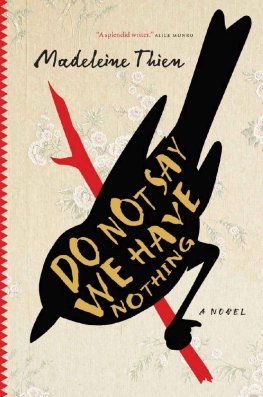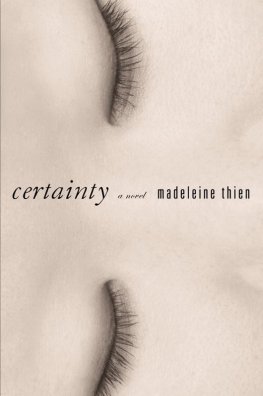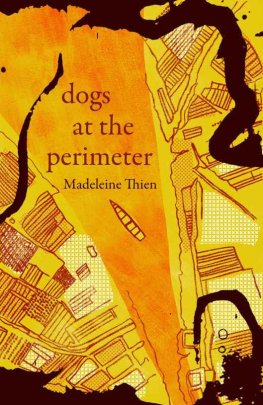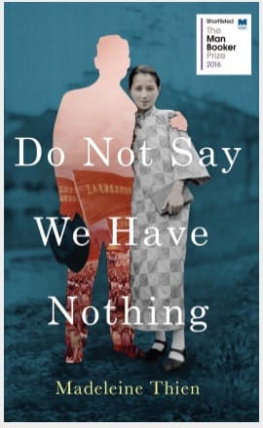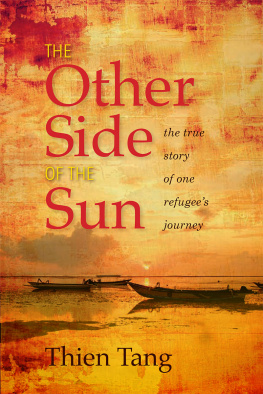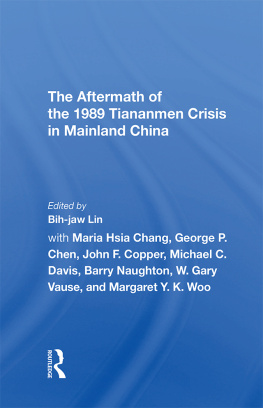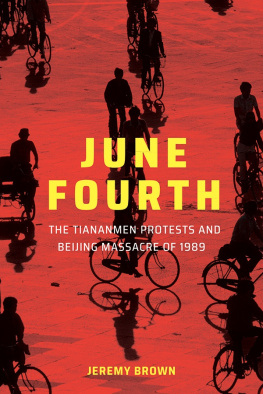Madeleine Thien
Do Not Say We Have Nothing
For my mother and father and Katherine and Rawi
There are a thousand ways to live. Just how many do the two of us know?
ZHANG WEI, The Ancient Ship
Of all the scenes that crowded the cave walls, the richest and most intricate were those of paradise.
COLIN THUBRON, Shadow of the Silk Road
IN A SINGLE YEAR, my father left us twice. The first time, to end his marriage, and the second, when he took his own life. That year, 1989, my mother flew to Hong Kong and laid my father to rest in a cemetery near the Chinese border. Afterwards, distraught, she rushed home to Vancouver where I had been alone. I was ten years old.
Here is what I remember:
My father has a handsome, ageless face; he is a kind but melancholy man. He wears glasses that have no frames and the lenses give the impression of hovering just before him, the thinnest of curtains. His eyes, dark brown, are guarded and unsure; he is only 39 years old. My fathers name was Jiang Kai and he was born in a small village outside of Changsha. Later on, when I learned my father had been a renowned concert pianist in China, I thought of the way his fingers tapped the kitchen table, how they pattered across countertops and along my mothers soft arms all the way to her fingertips, driving her crazy and me into fits of glee. He gave me my Chinese name, Jiang Li-ling, and my English one, Marie Jiang. When he died, I was only a child, and the few memories I possessed, however fractional, however inaccurate, were all I had of him. Ive never let them go.
In my twenties, in the difficult years after both my parents had passed away, I gave my life wholeheartedly to numbers observation, conjecture, logic and proof, the tools we mathematicians have not only to interpret, but simply to describe the world. For the last decade I have been a professor at Simon Fraser University in Canada. Numbers have allowed me to move between the unimaginably large and the magnificently small; to live an existence away from my parents, their affairs and unrequited dreams and, I used to think, my own.
Some years ago, in 2010, while walking in Vancouvers Chinatown, I passed a store selling DVDs. I remember that it was pouring rain and the sidewalks were empty. Concert music rang from two enormous speakers outside the shop. I knew the music, Bachs Sonata for Piano and Violin No. 4, and I was drawn towards it as keenly as if someone were pulling me by the hand. The counterpoint, holding together composer, musicians and even silence, the music, with its spiralling waves of grief and rapture, was everything I remembered.
Dizzy, I leaned against the glass.
And suddenly I was in the car with my father. I heard rain splashing up over the tires and my father, humming. He was so alive, so beloved, that the incomprehensibility of his suicide grieved me all over again. By then, my father had been dead for two decades, and such a pure memory of him had never come back to me. I was thirty-one years old.
I went inside the store. The pianist, Glenn Gould, appeared on a flatscreen: he and Yehudi Menuhin were performing the Bach sonata I had recognized. There was Glenn Gould hunched over the piano, wearing a dark suit, hearing patterns far beyond the range of what most of us are given to perceive, and he wasso familiar to me, like an entire language, a world, I had forgotten.
In 1989, life had become a set of necessary routines for my mother and me: work and school, television, food, sleep. My fathers first departure happened at the same time as momentous events occurring in China, events which my mother watched obsessively on CNN. I asked her who these protesters were, and she said they were students and everyday people. I asked if my father was there, and she said, No, its Tiananmen Square in Beijing. The demonstrations, bringing over a million Chinese citizens into the streets, had begun in April, when my father still lived with us, and continued after he disappeared to Hong Kong. Then, on June 4th, and in the days and weeks following the massacre, my mother wept. I watched her night after night. Ba had defected from China in 1978 and was forbidden from re-entering the country. But my incomprehension attached itself to the things I could see: those chaotic, frightening images of people and tanks, and my mother in front of the screen.
That summer, as if in a dream, I continued my calligraphy lessons at the nearby cultural centre, using brush and ink to copy line after line of Chinese poetry. But the words I could recognize big, small, girl, moon, sky (, , , , ) were few. My father spoke Mandarin and my mother Cantonese, but I was fluent only in English. At first, the puzzle of the Chinese language had seemed a game, a pleasure, but my inability to understand began to trouble me. Over and over, I wrote characters I couldnt read, making them bigger and bigger until excess ink soaked the flimsy paper and tore it. I didnt care. I stopped going.
In October, two police officers came to our door. They informed my mother that Ba was gone, and that the coroners office in Hong Kong would handle the file. They said Bas death was a suicide. Then, quiet (q) became another person living inside our house. It slept in the closet with my fathers shirts, trousers and shoes, it guarded his Beethoven, Prokofiev and Shostakovich scores, his hats, armchair and special cup. Quiet () moved into our minds and stormed like an ocean inside my mother and me. That winter, Vancouver was even more grey and wet than usual, as if the rain was a thick sweater we couldnt remove. I fell asleep certain that, in the morning, Ba would wake me as he always had, his voice tugging me from sleep, until this delusion compounded the loss, and hurt more than what had come before.
Weeks crept by, and 1989 disappeared inside 1990. Ma and I ate dinner on the sofa every night because there was no space on our dining table. My fathers official documents certificates of various kinds, tax declarations had already been organized, but the odds and ends persisted. As Ma investigated the apartment more thoroughly, other bits of paper came to light, music scores, a handful of letters my father had written but never sent (Sparrow, I do not know if this letter will reach you, but) and ever more notebooks. As I watched these items increase, I imagined my mother believed that Ba would reincarnate as a piece of paper. Or maybe she believed, as the ancients did, that words written on paper were talismans, and could somehow protect us from harm.
Most nights, Ma would sit among them, still in her office clothes.
I tried not to bother her. I stayed in the adjoining living room and heard, now and then, the nearly soundless turning of pages.
The q of her breathing.
Rain exploding and slicing down the window panes.
We were suspended in time.
Over and over, the No. 29 electric bus clattered past.
I fantasized conversations. I tried to imagine Ba reborn in the underworld, buying another new diary, using a different currency, and slipping his change into a new coat pocket, a lightweight coat made of feathers or maybe a cloak of camel wool, a coat sturdy enough for both heaven and the underworld.
Meanwhile, my mother distracted herself by trying to find my fathers family, wherever they might be, to tell them that their long-lost son or brother or uncle no longer survived in this world. She began searching for Bas adoptive father, a man who had once lived in Shanghai and had been known as the Professor. He was the only family Ba had ever mentioned. The search for information was slow and painstaking; there was no e-mail or internet back then and so it was easy for Ma to send a letter but difficult to obtain a true answer. My father had left China a long time ago and if the Professor were still alive, he would be a supremely old man.

